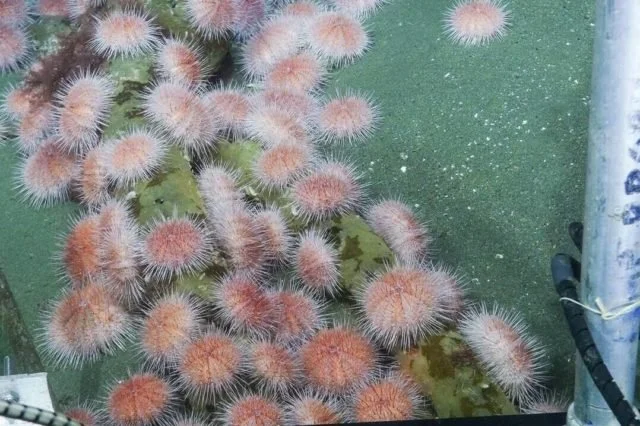A research facility at the University of Victoria is using new deep-sea droids to expand climate tracking in the northeast Pacific Ocean. Ocean Networks Canada (ONC) says five specialized data collecting tools, known as Argo floats, have been deployed to record conditions in the deepest parts of the northeast Pacific. Typically, an Argo float, which has a lifespan of four to five years, descends about two kilometres beneath the surface level for up to 10 days, then returns to the ocean surface to transmit data. It then dives back down again, repeating the process until it dies.
B.C’s pink sea urchins are on the move to shallower waters thanks to climate change
Pink sea urchins off the coast of Vancouver Island are expanding into shallower waters, in what researchers say is an indication of how rapidly climate change is affecting ocean life. Researchers at Memorial University, Ocean Networks Canada and the University of Victoria found the urchins, living as deep as 400 metres below, were expanding their populations into shallower water at an average rate of 3.5 metres per year as ocean warming reduces oxygen levels and food sources at lower depths.
Expert Q&A on water crisis amidst climate change
The threat to water security is just as urgent as the climate crisis, says Oliver M. Brandes, project lead of the POLIS Water Sustainability Project at the University of Victoria. For more than 20 years, Brandes has worked with UVic researchers, students and collaborators, as well as government committees, community members and other partners to raise the alarm while continuing to nourish a sense of hope.
A second chance: Canada, U.S. renegotiate a critical water treaty
The Columbia River Treaty, an international agreement governing the flow of water between British Columbia and six U.S. states, will be 55 years old this year. It has not aged well. The river springs from the Columbia Icefield in the Rocky Mountains of B.C. and winds 1,930 kilometres through the Northwestern United States – Washington, Oregon, Idaho, Montana, Nevada and Wyoming. No other river in North America spills more water into the Pacific Ocean.





